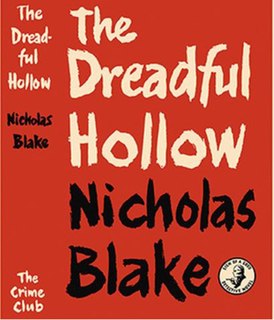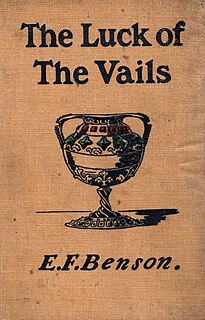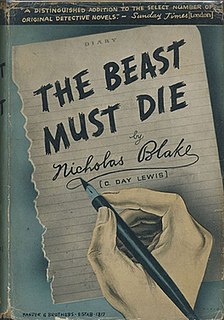
A Confederacy of Dunces is a picaresque novel by American novelist John Kennedy Toole which reached publication in 1980, eleven years after Toole's death. Published through the efforts of writer Walker Percy and Toole's mother, Thelma, the book became first a cult classic, then a mainstream success; it earned Toole a posthumous Pulitzer Prize for Fiction in 1981, and is now considered a canonical work of modern literature of the Southern United States.

Anthony Berkeley Cox was an English crime writer. He wrote under several pen-names, including Francis Iles, Anthony Berkeley and A. Monmouth Platts.

And So to Murder is a mystery novel by the American writer John Dickson Carr, who published it under the name of Carter Dickson. It is a whodunnit and features the series detective Sir Henry Merrivale and Scotland Yard Chief Inspector Humphrey Masters.
Matthew John Reilly is an internationally bestselling Australian action thriller writer.
Helen Reilly, was an American mystery writer known for a series of novels featuring Inspector Christopher McKee, head of the fictitious Manhattan Homicide Squad. She wrote mostly under her own name but also under the pseudonym Kieran Abbey. A member of the Mystery Writers of America, she served as its president in 1953.

No Friendly Drop is a 1931 mystery detective novel by the British writer Henry Wade. It was the second in a series of seven novels featuring the character of Inspector Poole, published during the Golden Age of Detective Fiction. It was released in the United States the following year by Brewer and Warren where it received positive reviews in the New York Herald Tribune and the New York Evening Post, with the latter describing it as "A superior detective story, depending more upon intrinsic interest in a logical plot than upon excitement and goriness for its hold on the reader".

Laurels are Poison is a 1942 mystery detective novel by the British writer Gladys Mitchell. It is the fourteenth in her long-running series featuring the psychoanalyst and amateur detective Mrs Bradley. It was Mitchell's own favourite among her novels and has been considered her best by other critics. It introduced the character of Laura Menzies who became recurring assistant of Mrs Bradley in subsequent novels.

The Dreadful Hollow is a 1953 detective novel by Cecil Day-Lewis, written under the pen name of Nicholas Blake. It is the tenth in a series of novels featuring the private detective Nigel Strangeways.

Hangman's Curfew is a 1941 mystery detective novel by the British writer Gladys Mitchell. It is the twelfth in her long-running series featuring the psychoanalyst and amateur detective Mrs Bradley.

The Luck of the Vails is a 1901 mystery crime novel by the British writer E.F. Benson, later better known as the author of the Mapp and Lucia series. It was one of only two ventures he made into the genre during his prolific career along with The Blotting Book (1908). In his autobiography Benson numbered it as one of only four of his novels he was satisfied with.

Not to Be Taken is a 1938 mystery detective novel by the British writer Anthony Berkeley. It was one of several stand-alone novels he wrote alongside his series featuring the private detective Roger Sheringham. It was written when the Golden Age of Detective Fiction was at its height. It was published in the United States with the alternative title A Puzzle in Poison.

Part for a Poisoner is a 1948 detective novel by E.C.R. Lorac, the pen name of the British writer Edith Caroline Rivett. It is the thirty first in her long-running series featuring Chief Inspector MacDonald of Scotland Yard, one of the more conventional detectives of the Golden Age of Detective Fiction who relies on standard police procedure to solve his cases. It was published in the United States by Doubleday under the alternative title of Place for a Poisoner.

Death at Breakfast is a 1936 detective novel by John Rhode, the pen name of the British writer Cecil Street. It is the twenty third in his long-running series of novels featuring Lancelot Priestley, a Golden Age armchair detective. It received a negative review from Cecil Day-Lewis, writing as Nicholas Blake in The Spectator noting "Some attempt is made to establish the character of the victim, but the remaining dramatis personae are stuffed men".

Poison for One is a 1934 detective novel by John Rhode, the pen name of the British writer Cecil Street. It is the eighteenth in his long-running series of novels featuring Lancelot Priestley, a Golden Age armchair detective. It combines elements of the locked room mystery and country house mystery. Reviewing the book in the Sunday Times leading crime writer Dorothy L. Sayers considered it "as usual, sound, pleasantly written, and entertaining" although she complained the book "was rather spoilt for me by the jacket, which deliberately gives away one-half of the solution."

The Two Graphs is a 1950 detective novel by John Rhode, the pen name of the British writer Cecil Street. It is the fiftieth in his long-running series of novels featuring Lancelot Priestley, a Golden Age armchair detective. It was published in America by Dodd Mead under the alternative title Double Identities. Writing in The Observer Maurice Richardson noted a "slight slackening of tension towards the finish but an excellent specimen of Rhode’s later period."

The Case of Colonel Marchand is a 1933 detective novel by E.C.R. Lorac, the pen name of the British writer Edith Caroline Rivett. It is the fourth book featuring Chief Inspector MacDonald of Scotland Yard who appeared in a lengthy series of novels during the Golden Age of Detective Fiction.

The Claverton Mystery is a 1933 detective novel by John Rhode, the pen name of the British writer Cecil Street. It is the fifteenth in his long-running series of novels featuring Lancelot Priestley, a Golden Age armchair detective. It was published in the United States by Dodd Mead with the altered title The Claverton Affair. The tone of the book has been described as much darker than the author's other novels.

The Venner Crime is a 1933 detective novel by John Rhode, the pen name of the British writer Cecil Street. It is the sixteenth in his long-running series of novels featuring Lancelot Priestley, a Golden Age armchair detective. In Britain it was published by Odhams Press, the only one of his works be done so, while in the United States it was handled by his usual publisher Dodd Mead. It has been described as a sort of sequel to his previous book The Claverton Mystery. Writing in the New York Times Isaac Anderson considered "This is not one of the best of the Dr. Priestley yarns, but it is plenty good enough to pass an idle evening."

Death at the Helm is a 1941 detective novel by John Rhode, the pen name of the British writer Cecil Street. It is the thirty fourth in his long-running series of novels featuring Lancelot Priestley, a Golden Age armchair detective. It makes reference to earlier stories in the series as the lawyer had defended in court the murderers Priestley had exposed in The Corpse in the Car and Death on the Boat Train. The characters in it were arguably more complexly drawn than in other books by the author.

The Beast Must Die is a 1938 detective novel by Cecil Day-Lewis, written under the pen name of Nicholas Blake. It combines elements of the inverted thriller with a classic Golden Age-style investigation. It is the fourth in a series of novels featuring the private detective Nigel Strangeways. The title is inspired by a line in Four Serious Songs by Johannes Brahms, itself a reference to Ecclesiastes.


















